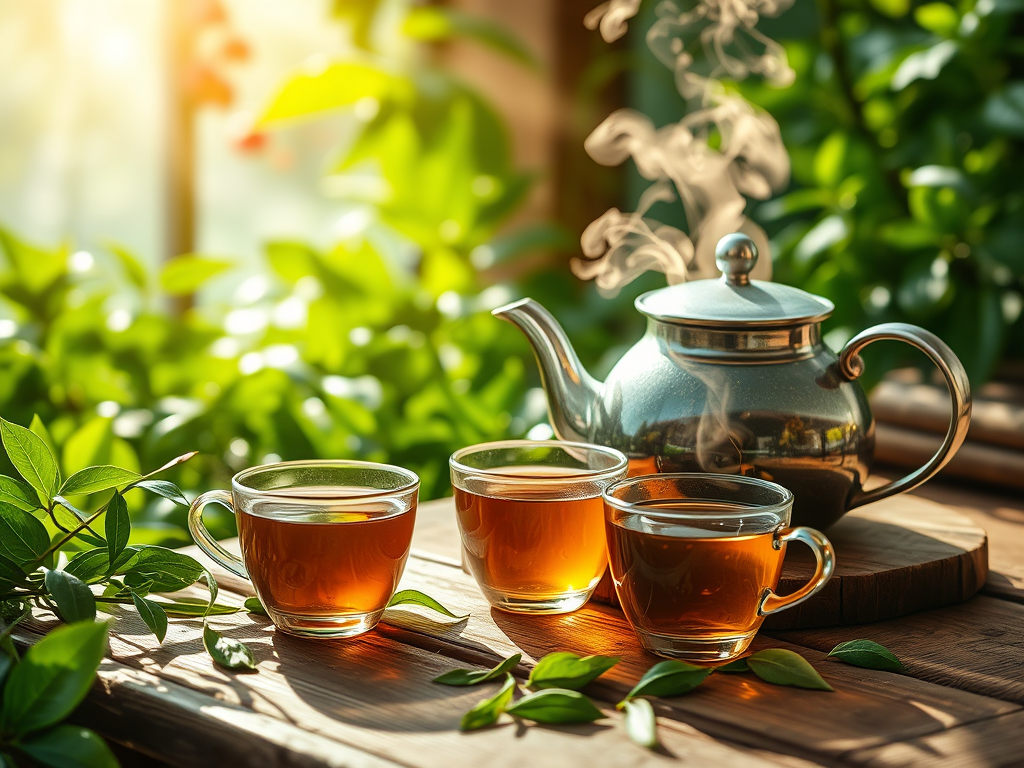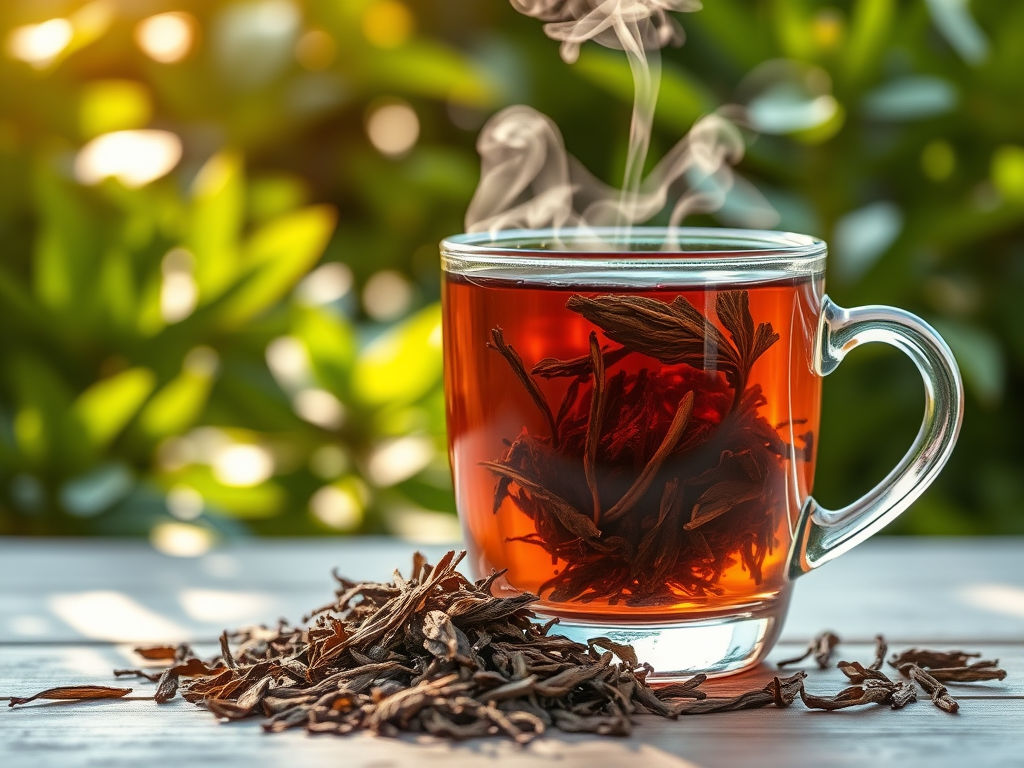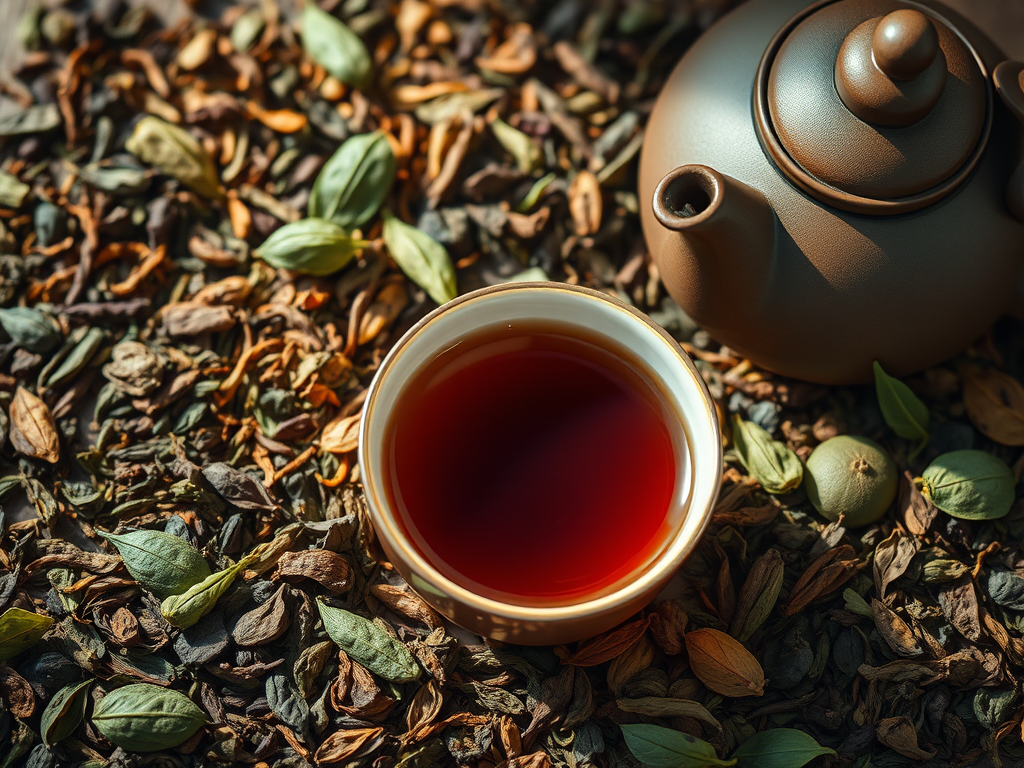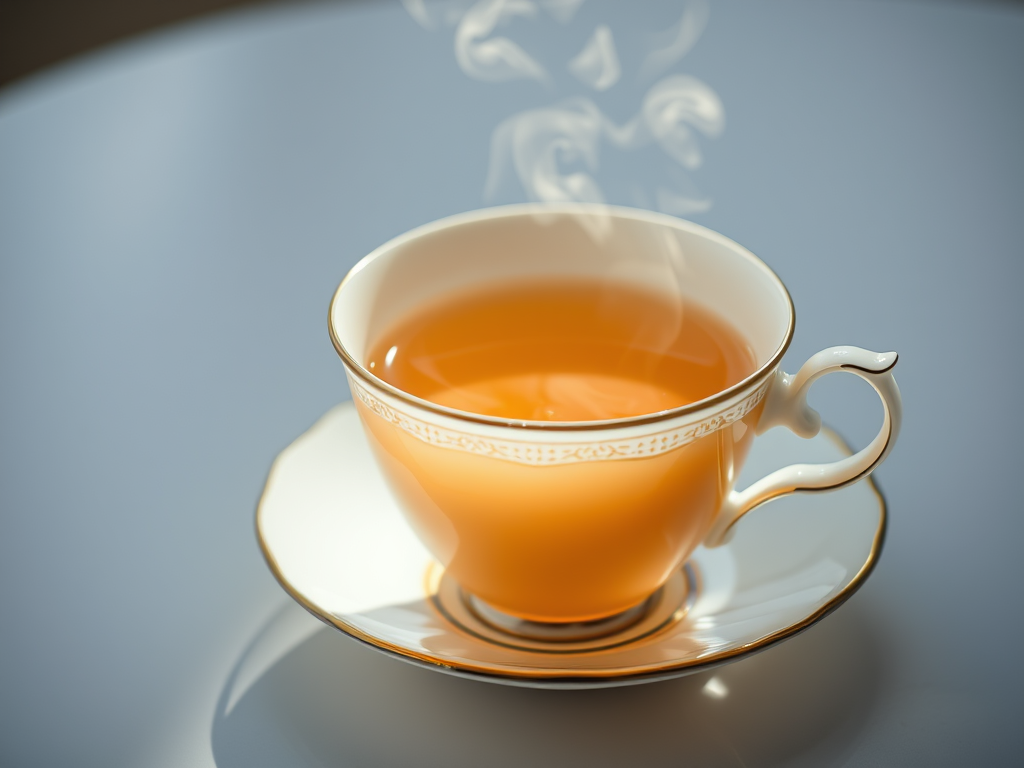**5 Health Benefits of Drinking Tea Daily** 🍵—**1. 🧠 Brain Boost**Green & black teas contain caffeine + L-theanine → sharper focus, better memory, and reduced brain fog.—**2. ❤️ Heart Health**Antioxidants in tea help lower bad cholesterol, reduce blood pressure & support overall cardiovascular wellness.—**3. 🛡️ Immune Support**Herbal teas like chamomile & ginger fight inflammation and enhance immunity naturally.—**4. ⚖️ Weight Management**Green, oolong & pu-erh teas rev up metabolism and support healthy fat burning.—**5. 💧 Digestion & Hydration**Tea keeps you hydrated & soothes digestive issues like bloating and indigestion.—🌿
5 Health Benefits of Drinking Tea Every Day

1 . 🧠 Brain Boost: The Cognitive Power of Green and Black Tea
In a fast-paced world where mental clarity and focus are essential, many people turn to caffeine for an energy lift. While coffee often dominates the conversation, green and black teas offer a gentler yet highly effective brain-boosting alternative. Their unique combination of caffeine and L-theanine provides a balanced enhancement to mental performance, making them powerful tools for improving focus, memory, and cognitive function.
What Makes Tea a Brain Booster?
Both green and black teas contain moderate levels of caffeine, a natural stimulant that enhances alertness and concentration. Caffeine works by blocking adenosine, a chemical in the brain that promotes drowsiness. This leads to increased activity of neurotransmitters such as dopamine and norepinephrine, resulting in improved mood, faster reaction times, and heightened mental clarity.
However, tea brings something extra to the table that coffee doesn’t: L-theanine.
L-Theanine: Calm Focus Without the Crash
L-theanine is an amino acid found almost exclusively in tea leaves. On its own, it promotes relaxation without sedation, but when paired with caffeine, it creates a unique state of calm alertness. Unlike the jittery, anxious energy that sometimes follows a strong cup of coffee, tea’s caffeine–L-theanine blend produces smooth, focused mental energy that can last for hours.
This combination has been shown in studies to:
- Improve working memory and attention span
- Increase alpha brain wave activity, linked to creative thinking and alert relaxation
- Reduce mental fatigue
- Enhance accuracy and cognitive performance
Improved Memory and Learning
Green and black teas are also beneficial for those looking to improve memory and learning abilities. Research has found that regular tea consumption can lead to better performance in memory recall tasks and faster information processing. L-theanine’s effect on reducing stress and promoting relaxation is particularly helpful during study or work, allowing the brain to absorb and retain information more effectively.
Long-Term Brain Support
Beyond immediate cognitive benefits, tea offers long-term support for brain health. Both green and black teas are rich in polyphenols — plant compounds with antioxidant and anti-inflammatory properties. These include EGCG (Epigallocatechin gallate) in green tea and theaflavins in black tea, which have been linked to:
- Reduced oxidative stress in the brain
- Lowered risk of age-related cognitive decline
- Possible protection against Alzheimer’s and Parkinson’s disease
Conclusion
If you’re looking for a natural way to improve your mental performance, green and black teas are an excellent choice. Their synergistic blend of caffeine and L-theanine supports clear thinking, sharper focus, improved memory, and reduced brain fog — all without the overstimulation that often comes from other caffeinated drinks.
2 . ❤️ Heart Health: How Tea Supports a Stronger Cardiovascular System

A healthy heart is the foundation of a healthy life. While regular exercise and a balanced diet are key to cardiovascular wellness, emerging research shows that something as simple as drinking green or black tea daily can provide powerful benefits for your heart.
Both green and black teas are rich in antioxidants, particularly flavonoids, which help reduce bad cholesterol (LDL), lower blood pressure, improve blood vessel function, and reduce the risk of heart disease and stroke.
🫖 The Antioxidant Power of Tea
The heart-health benefits of tea begin with its high concentration of antioxidants — plant-based compounds that protect the body from oxidative stress and inflammation. Oxidative stress can damage blood vessels, contribute to plaque buildup in arteries, and trigger inflammatory responses that strain the cardiovascular system.
Flavonoids, found in abundance in both green and black teas, act as natural protectors by:
- Improving the flexibility of blood vessels
- Reducing arterial stiffness
- Preventing LDL cholesterol from oxidizing (a key step in plaque formation)
- Enhancing nitric oxide production, which relaxes blood vessels and improves circulation
These effects support healthy blood flow and reduce strain on the heart.
🩸 Lowering Cholesterol and Blood Pressure
Research shows that drinking tea regularly can help manage two of the most significant risk factors for heart disease: high cholesterol and high blood pressure.
- LDL (“bad”) cholesterol: Studies have found that the catechins in green tea and the theaflavins in black tea can reduce LDL cholesterol levels, which helps prevent plaque from building up in the arteries.
- Blood pressure: Tea has also been linked to lower systolic and diastolic blood pressure, especially in people with hypertension or pre-hypertension. This is believed to be due to tea’s ability to improve endothelial function — how well your blood vessels dilate and contract.
Even moderate tea consumption (1–3 cups per day) has shown positive effects over time.
🛡️ Reduced Risk of Heart Disease and Stroke
Multiple population studies have shown that people who drink tea regularly have a lower risk of heart disease. A long-term study published in the European Journal of Preventive Cardiology found that habitual tea drinkers had a 20–30% reduced risk of cardiovascular events compared to non-drinkers.
Green tea, in particular, has been associated with a lower risk of stroke and heart attack, likely due to its high levels of catechins — antioxidants that support healthy arteries and reduce inflammation.
🧘♀️ A Calming Ritual for a Stronger Heart
Beyond its physical benefits, drinking tea can also be a calming ritual that reduces stress, another major contributor to heart disease. Sitting down for a warm cup of tea encourages relaxation, mindfulness, and connection — all of which support a healthier cardiovascular system.
❤️ Conclusion
Incorporating green or black tea into your daily routine is a simple, enjoyable way to support your heart. With its powerful antioxidants, cholesterol-lowering effects, and stress-reducing properties, tea is more than just a beverage — it’s a heart-healthy habit with real, long-lasting benefits.
So go ahead, pour yourself a cup. Your heart will thank you.
🛡️ Immune Support: How Herbal Teas Naturally Strengthen Your Defenses
When it comes to staying healthy, a strong immune system is your body’s first line of defense. One simple and natural way to support immunity is by drinking herbal teas — especially varieties like chamomile, ginger, and echinacea.
These herbal teas are rich in antioxidants and anti-inflammatory compounds that help your body fight off infections and recover more quickly from illness. For example, ginger tea contains compounds like gingerol that help reduce inflammation and boost immune cell activity. It’s also great for soothing sore throats and clearing sinuses.
Chamomile tea, known for its calming properties, also supports the immune system by promoting restful sleep — which is essential for proper immune function. Plus, chamomile contains natural antimicrobial agents that may help the body ward off bacteria and viruses.
Other herbal teas, like peppermint, licorice root, and turmeric, can also contribute to immune health by easing digestion, reducing stress, and protecting cells from oxidative damage.
Best of all, herbal teas are caffeine-free, making them suitable for any time of day. Whether you’re preventing illness or recovering from one, a warm cup of herbal tea is a comforting, natural way to keep your immune system resilient.

4 ⚖️ Weight Management: How Green, Oolong, and Pu-erh Teas Support Healthy Fat Burning
Managing a healthy weight is about more than just cutting calories — it’s about supporting your body’s natural ability to burn fat, balance energy, and maintain a healthy metabolism. While no single food or drink is a magic solution, certain teas — particularly green tea, oolong tea, and pu-erh tea — have gained recognition for their ability to enhance metabolism, increase fat oxidation, and support long-term weight control.
🔥 How These Teas Boost Metabolism
Each of these teas comes from the Camellia sinensis plant but undergoes different levels of oxidation and fermentation. Despite their differences, they all contain powerful compounds that influence how the body processes fat and energy.
- Green tea is rich in catechins, especially EGCG (Epigallocatechin gallate), which helps boost metabolism and enhance fat burning — especially during exercise. Studies show that green tea extract can increase the body’s energy expenditure and improve the breakdown of fat, particularly in the abdominal area.
- Oolong tea, partially oxidized between green and black tea, contains both catechins and theaflavins. It has been shown to improve fat mobilization and energy expenditure, helping reduce body fat more effectively over time.
- Pu-erh tea, a fermented tea from China, is believed to aid weight management by reducing fat accumulation and enhancing fat metabolism. It may also help regulate blood sugar and cholesterol, which are crucial for weight control.
🧬 Tea’s Thermogenic Effects
These teas are considered thermogenic, meaning they help the body produce more heat and, in turn, burn more calories. Caffeine plays a key role here — it stimulates the central nervous system, encouraging the body to use more energy, even at rest.
When combined with catechins and other natural compounds in tea, caffeine becomes more effective at promoting fat oxidation without causing the jitteriness or energy crash that often follows from high-caffeine drinks like coffee or energy beverages.
🧘♀️ Appetite Control and Blood Sugar Support
In addition to boosting metabolism, green, oolong, and pu-erh teas may help curb appetite and prevent cravings by influencing hunger-regulating hormones and stabilizing blood sugar levels. When blood sugar spikes and crashes are reduced, people are less likely to overeat or reach for sugary snacks.
☕ Making Tea Part of a Healthy Lifestyle
While tea can assist in weight management, it’s not a replacement for healthy habits. Drinking 2–4 cups of green, oolong, or pu-erh tea daily — combined with regular exercise, a balanced diet, and sufficient sleep — may lead to noticeable improvements in body composition over time.
Choose unsweetened tea to avoid added calories, and consider drinking it before meals or during your morning routine to naturally support digestion and energy use throughout the day.
✅ Conclusion
Green, oolong, and pu-erh teas are more than just flavorful drinks — they’re natural allies in your weight management journey. Their unique combination of antioxidants, fat-burning compounds, and metabolism-boosting properties make them powerful tools for anyone looking to maintain a healthy body weight the smart and sustainable way.
Pour yourself a cup — your metabolism might just thank you.

5 💧 Digestion & Hydration: How Tea Supports a Calm Gut and a Hydrated Body
In the world of wellness, tea has long been celebrated for its therapeutic qualities. Beyond its warming comfort and rich tradition, tea serves a double purpose that’s often overlooked: it hydrates the body while gently supporting digestive health. Unlike sugary sodas or dehydrating coffee, certain types of tea help the body absorb water efficiently while addressing common digestive concerns like bloating, gas, and indigestion.
Let’s explore how tea plays a vital, underrated role in gut balance and hydration — two cornerstones of overall health.
💦 Tea: A Surprisingly Effective Hydrator
Contrary to a popular misconception, tea doesn’t dehydrate — it hydrates. While caffeinated beverages can act as mild diuretics in large quantities, the caffeine content in most teas (especially green, white, and herbal teas) is low to moderate. In fact, tea contributes significantly to your daily fluid intake, making it an excellent alternative to plain water.
Moreover, herbal teas like rooibos, peppermint, or ginger tea are naturally caffeine-free, allowing you to stay hydrated all day — even into the evening — without disturbing your sleep or overloading your system with stimulants.
🌱 Tea’s Role in Digestive Wellness
Certain teas have an almost ancient reputation for aiding digestion. In traditional Chinese medicine and Ayurvedic practices, herbal infusions were prescribed to stimulate digestion, relieve bloating, and calm the stomach. Modern science is beginning to support these long-standing uses.
Here’s how specific teas ease common digestive complaints:
🍃 Peppermint Tea: Nature’s Digestive Soother
Peppermint tea contains menthol, a compound that relaxes the muscles of the gastrointestinal tract. This can help relieve spasms, gas, cramping, and bloating, especially after a heavy meal. Peppermint is also known to reduce feelings of nausea, making it a go-to for queasy stomachs or motion sickness.
🌿 Ginger Tea: A Spicy Gut Healer
Ginger is a digestive powerhouse. It stimulates saliva and bile production, encouraging smooth digestion from start to finish. Ginger tea can be especially helpful after meals by promoting gastric emptying — reducing that heavy, sluggish feeling many people experience after eating. It also fights inflammation in the gut and helps alleviate nausea, indigestion, and acid reflux.
🌼 Chamomile Tea: The Gentle Calmer
Chamomile has antispasmodic and anti-inflammatory properties that help ease upset stomachs, soothe intestinal muscles, and reduce abdominal discomfort. It’s particularly helpful for people who experience stress-related digestive issues, such as IBS or nervous stomach.
🍄 Pu-erh Tea: The Fermented Gut Ally
Pu-erh tea, a fermented black tea from China, is rich in probiotic-like compounds that can support a healthy gut microbiome. Though lesser known than green or black tea, pu-erh helps aid fat digestion and metabolic detoxification, and it may reduce feelings of heaviness or sluggish digestion after rich meals.
🧘♂️ Digestive Balance Isn’t Just About Food
Digestion isn’t just a mechanical process — it’s also deeply connected to the nervous system. Many digestive problems, like bloating or indigestion, stem from stress, anxiety, or irregular eating patterns.
Tea offers a mindful, calming ritual that encourages your parasympathetic nervous system — the “rest and digest” state — to activate. Taking a few quiet moments with a warm cup of tea before or after a meal sends signals to your body that it’s safe to relax, absorb nutrients, and process food efficiently.
🚫 Skip Sugary Beverages: Tea is the Smart Swap
Modern diets are often flooded with sweetened beverages, which can worsen bloating, spike insulin levels, and even contribute to gut imbalances. Replacing soft drinks or flavored waters with pure herbal teas is a simple yet effective way to:
- Reduce sugar intake
- Avoid unnecessary calories
- Support hydration and gut comfort simultaneously
Best of all, most teas are zero-calorie, offering a light yet flavorful alternative that won’t interfere with digestive function.
✅ Final Sip: Tea as a Daily Digestive Companion
Tea is far more than a cozy drink or an ancient tradition — it’s a functional, multipurpose tool for modern wellness. By promoting hydration and gently assisting your body’s natural digestive processes, teas like peppermint, ginger, chamomile, and pu-erh can help you feel lighter, calmer, and more in sync with your body.
Whether you drink it hot in the morning, cold with lemon in the afternoon, or warm before bed, incorporating tea into your daily routine may be one of the easiest, most enjoyable ways to nurture both hydration and digestive ease — all from a single, soothing cup.



Hhh